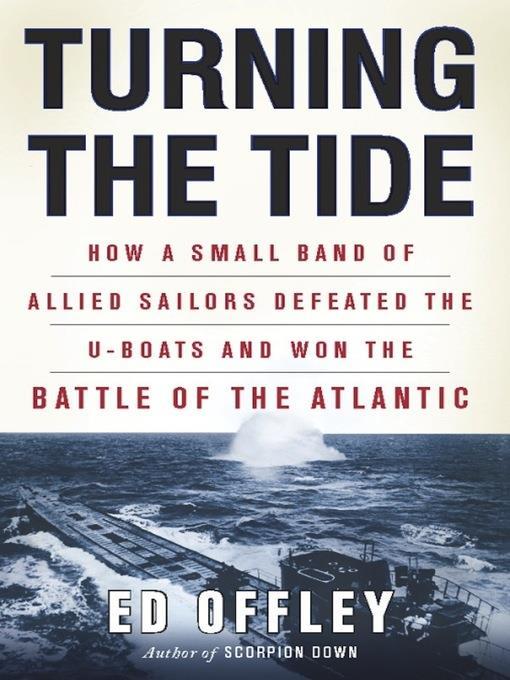
Turning the Tide
How a Small Band of Allied Sailors Defeated the U-boats and Won the Battle of the Atlantic
کتاب های مرتبط
- اطلاعات
- نقد و بررسی
- دیدگاه کاربران
نقد و بررسی

March 21, 2011
WWII's Battle of the Atlantic, where Admiral Dönitz's U-boats attempted to starve Great Britain into capitulation, was one of many crucial points in that conflict that were indispensable to Allied victory. If the Germans had succeeded in interdicting its maritime lifeline, Britain would not have become the Allies' "unsinkable aircraft carrier" and staging point for invasion, which in turn meant that there would have been no second front in France, and this in turn could have lead Stalin to make a separate peace with Hitler. By examining two actions against Allied convoys in March and May 1943, Offley (Scorpion Down) demonstrates how the Allies were more responsive to changing technological and tactical conditions, while the Kriegsmarine was hampered by a failure to recognize the same changes and by a culture that encouraged reporting inflated results; curiously, both opponents had cracked the other's codes, but the Allies made better use of the intelligence. The author focuses on individual combatants, from the lowest ranks to the highest, emphasizing the human elements and making for an extremely readable text that should appeal to neophytes as well as professionals.

March 1, 2011
A military reporter examines the climax of "the longest and deadliest naval conflict in world history."
Allied plans for a Britain-based amphibious assault on the European continent, not to mention the very survival of the United Kingdom, depended on unharried use of the North Atlantic's shipping lanes, lifeline to the United States and its vast supplies. In March 1943, Grossadmiral Karl Dönitz suddenly stepped up the attacks of his deadly U-boats. Striking day or night, the German submarines posed a critical threat to the merchant convoys and, consequently, to the outcome of World War II. Offley (Scorpion Down: Sunk by the Soviets, Buried by the Pentagon, 2007, etc.) meticulously re-creates the terrifying U-boat assaults during this pivotal spring (generous appendices help the reader keep track of the chessboard) and explains how the Allies turned the tide of the years-long battle. Improved tactics (more escort warships, more Liberator bombers, a shift from merely fending off subs to aggressively pursuing them), advances in technology (sonar, ship-based radar, high-frequency direction finding, air-dropped acoustic homing torpedoes, air-to-surface rockets launched by carrier-based aircraft), command of the cryptologic conflict, breaking the German naval Enigma code, even the vagaries of the notoriously severe North Atlantic weather—all accounted for the permanent advantage the Allies finally seized. As he traces these developments, the author enlivens the narrative with telling detail: a glimpse of life aboard the cramped and foul U-boats, a sample of hortatory messages from Dönitz to his fleet, accounts of merchant mariners who survived the torpedoes, estimates by U-boat commanders that inflated their kills, decisions by rogue captains to abandon the convoys, the war-game results of a lowly Admiralty captain that persuaded Churchill to shift more resources to the Atlantic. The fight would continue for another two years, but with a hoped-for new generation of subs and weapons never materializing, the Germans could no longer contemplate victory.
An intensely focused account that cuts through the battle's sprawl and duration, supplying the general reader with an appreciation of its character and importance.
(COPYRIGHT (2011) KIRKUS REVIEWS/NIELSEN BUSINESS MEDIA, INC. ALL RIGHTS RESERVED.)

April 1, 2011
World War II's Battle of the Atlantic, fighting the German U-Boats encroaching along the North American coast and the Caribbean, was the longest naval battle in history. This is an account of the crucial convoy battles of March to May 1943 that saw Allied naval escorts and air power finally subdue the deadly Kriegsmarine subs. Offley (Scorpion Down), a naval veteran and military historian, shows how the battle was very much a mind game, each side trying to outfox the other. The author's emphasis is on the harrowing experiences of the men on both sides, rather than on high-level policy decisions. The subtitle is misleading: thousands were involved in these battles. With a glossary and helpful appendixes that list the convoys, technical details, and so on, this is recommended as a primer for those new to this part of World War II history.
Copyright 2011 Library Journal, LLC Used with permission.

April 15, 2011
This sound, readable WWII naval history focuses on a crucial period of the Battle of the Atlantic, one Offley argues was the turning point in the campaign. At the beginning, in March 1943, the U-boats were wreaking havoc on many convoys. Gradually, the Allies brought a more effective arsenal to bearhunter-killer groups to reinforce convoys, long-range aircraft, the first escort carriers, ahead-thrown weapons, and more effective deciphering of the heavy radio traffic that German Admiral Doenitzs penchant for control generated. By May 1943, U-boats were being sunk regularly in the Bay of Biscay, on their way to or from the hunting grounds. At the end of a month in which 41 U-boats were sunk, the Germans called off the North Atlantic campaign. Equally strong in writing, research, and backgrounding, this is a fine addition to material on the epic Battle of the Atlantic.(Reprinted with permission of Booklist, copyright 2011, American Library Association.)

























دیدگاه کاربران